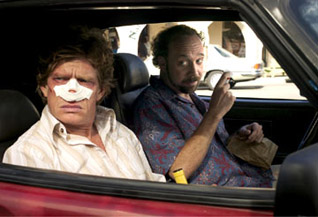Director's Spotlight:
Alexander Payne
April 6, 2010
In our last Director's Spotlight, we examined someone with a global perspective, having made movies set in South America and Africa. This week, doing something of a 180, we'll take a close look at a man who has largely focused on films that aim the lens only on Americans and, more specifically, the problems of average, middle class Americans.
Alexander Payne was born and raised in Omaha, Nebraska, and it's easy to imagine that his life has been populated by the type of characters and conflicts that we find in his films. After writing and directing the super-indie and critically praised Citizen Ruth in 1996, Payne started attracting attention as a UCLA film-school grad to keep tabs on. His next three features have all been nuanced character studies, and with each new entry, Payne seems to be garnering more critical and commercial buzz – though not necessarily acclaim from yours truly.
Election
As someone who is not too many years removed from a four-year stint in a public high school not terribly dissimilar from Omaha's Carver High, Election features some hard-to-swallow satire. Partially commentating on the American electoral system and partially skewering the prototypical high school hierarchy, this is not the easy, breezy satire of Mean Girls (which I watched and enjoyed while I was in high school). Election follows a few key players – first, there is Reese Witherspoon's Tracy Flick as the girl who knows every answer, and wants you to know that she does, too; she's smart, sure, but more than that, she's cunning – it's easy to imagine her bullying a teacher with her firm and demanding smile in order to get an extra vote or a higher mark in a class. We all grew up with at least one Tracy Flick. Then there's Matthew Broderick's social studies teacher, Mr. McAllister. He is well liked by his students, modest in ambition, attends the Carver High sporting events, and probably did the same thing two decades earlier; it's safe to say everyone had a Mr. McAllister at one point, too. Payne, while only rarely bridging into caricature status, manages to make these characters quite dynamic. Each player (there is also the school jock, the angry lesbian, and the bumbling faculty) is given an inner dialogue and serves as narrator through different portions of the film. The result is an intimate look at the flawed people and flawed system that make up high school politics. The observations are accurate and funny without being broad – there is no lowest-common-denominator humor here. Sure, we all knew a Tracy Flick, but did we always know what she was thinking? Why didn't Mr. McAllister ever aim higher? These questions and others get their answers in Payne's difficult-to-watch deconstruction of an average, middle-American high school.
Witherspoon and Broderick deserve some real kudos as well. Witherspoon had a big year in 1999, somehow managing to play two incredibly prissy, entitled high school girls in Election and the teen-sensation, Cruel Intentions. Both helped send her into a new stratosphere of stardom, with Legally Blonde not far off on the horizon. Watching Broderick, on the other hand, is surreal if you are a fan of Ferris Bueller's Day Off, a high school classic in its own right – Ferris is the character by which Broderick will almost certainly always be remembered (unless you're a big fan of Inspector Gadget, of course). In a unique case of having an actor's previous role influence the way you experience their current role, it is sobering, even depressing to see Broderick's Mr. McAllister mosey along through the halls of Carver High with his short-sleeve dress shirt, ugly-brown tie, and sad-conformist nature. Where Bueller thrived outside the system, McAllister flounders within its constraints. Somehow, this contrast elevates the film's message, and I wonder if Payne knew how much that casting decision would affect his film.
Continued:
1
2
3
4
|
|
|
|

![]() Tweet
Tweet
![]() Print this column
Print this column



